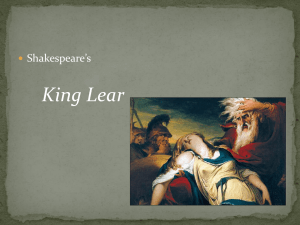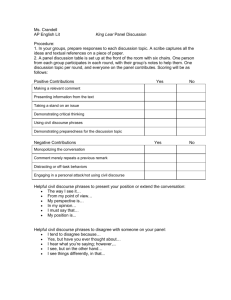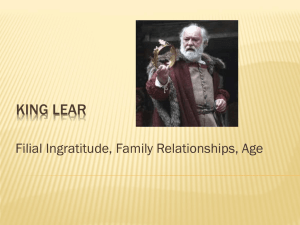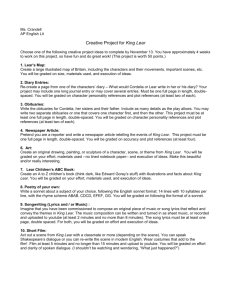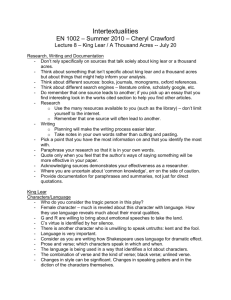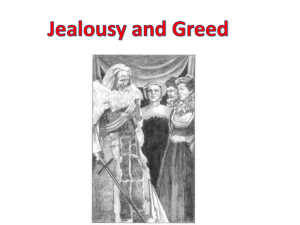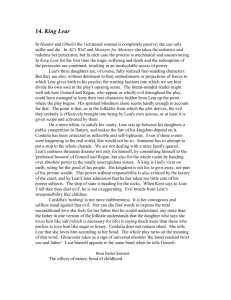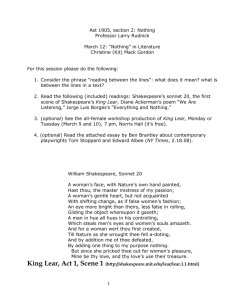`Right and wrong, good and evil are never entirely
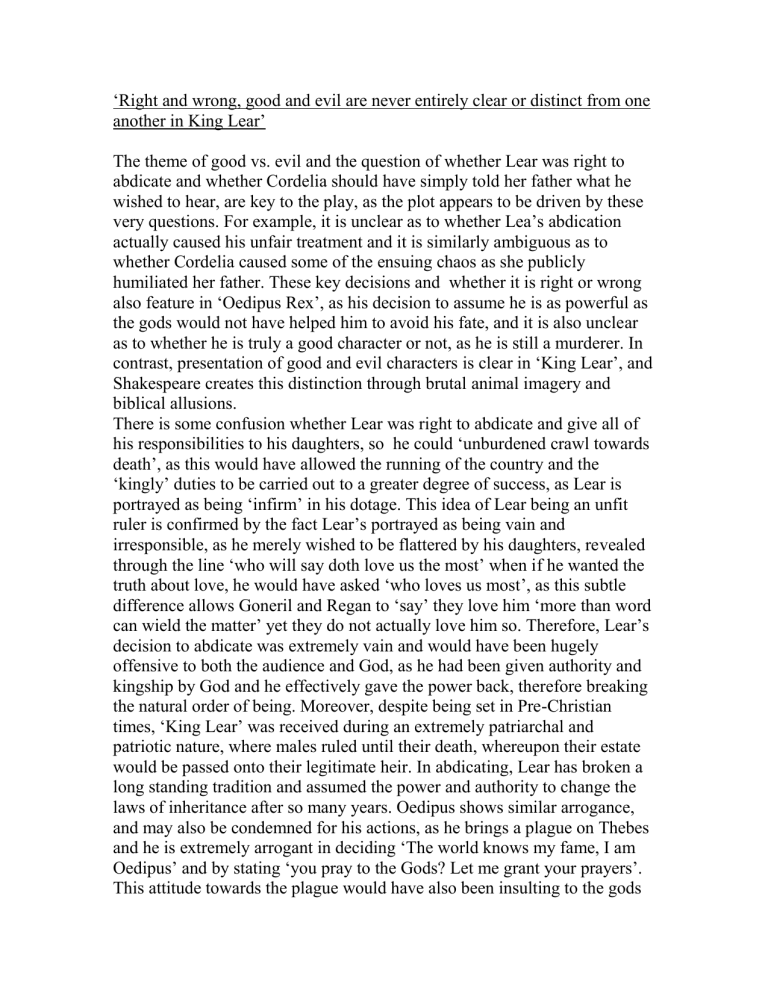
‘Right and wrong, good and evil are never entirely clear or distinct from one another in King Lear’
The theme of good vs. evil and the question of whether Lear was right to abdicate and whether Cordelia should have simply told her father what he wished to hear, are key to the play, as the plot appears to be driven by these very questions. For example, it is unclear as to whether Lea’s abdication actually caused his unfair treatment and it is similarly ambiguous as to whether Cordelia caused some of the ensuing chaos as she publicly humiliated her father. These key decisions and whether it is right or wrong also feature in ‘Oedipus Rex’, as his decision to assume he is as powerful as the gods would not have helped him to avoid his fate, and it is also unclear as to whether he is truly a good character or not, as he is still a murderer. In contrast, presentation of good and evil characters is clear in ‘King Lear’, and
Shakespeare creates this distinction through brutal animal imagery and biblical allusions.
There is some confusion whether Lear was right to abdicate and give all of his responsibilities to his daughters, so he could ‘unburdened crawl towards death’, as this would have allowed the running of the country and the
‘kingly’ duties to be carried out to a greater degree of success, as Lear is portrayed as being ‘infirm’ in his dotage. This idea of Lear being an unfit ruler is confirmed by the fact Lear’s portrayed as being vain and irresponsible, as he merely wished to be flattered by his daughters, revealed through the line ‘who will say doth love us the most’ when if he wanted the truth about love, he would have asked ‘who loves us most’, as this subtle difference allows Goneril and Regan to ‘say’ they love him ‘more than word can wield the matter’ yet they do not actually love him so. Therefore, Lear’s decision to abdicate was extremely vain and would have been hugely offensive to both the audience and God, as he had been given authority and kingship by God and he effectively gave the power back, therefore breaking the natural order of being. Moreover, despite being set in Pre-Christian times, ‘King Lear’ was received during an extremely patriarchal and patriotic nature, where males ruled until their death, whereupon their estate would be passed onto their legitimate heir. In abdicating, Lear has broken a long standing tradition and assumed the power and authority to change the laws of inheritance after so many years. Oedipus shows similar arrogance, and may also be condemned for his actions, as he brings a plague on Thebes and he is extremely arrogant in deciding ‘The world knows my fame, I am
Oedipus’ and by stating ‘you pray to the Gods? Let me grant your prayers’.
This attitude towards the plague would have also been insulting to the gods
and fundamentally wrong as Tiresias reveals through ‘you cannot equal the gods’ as this would not have helped his plight.
Whilst Lear can be blamed for making a fundamentally wrong decision, his daughter, Cordelia, may also be partly blamed for the chaos that ensues. For example, some critics have accentuated how Cordelia may have acted irresponsibly in saying ‘nothing’ and ‘love be silent’, and failing to ‘mend her speech a little’, as although she was speaking the truth, revealed through simple monosyllabic lexis, she managed to publicly humiliate her father many times. This behaviour would not have been acceptable during
Shakespearian times, as society was patriarchal and therefore the male would be obeyed at all costs and women would be unable to speak out or reveal their true feelings. Cordelia would have known this, yet she still merely says ‘I love you according to my bond’ and ‘I cannot heave my heart into my mouth’, which leads to her banishment as Lear ‘disclaims all parental care’ and declares she would be ‘ better not to have been born, than not to have pleased me better’. This allows the evil Goneril, Regan and
Edmund to take full power and exploit the frail and trusting Lear. Whilst other critics argue that Cordelia’s honesty was in fact right, with Bradley declaring her death was ‘the greatest injustice of the play’, therefore agreeing with Edgar’s final line of the play that it is ‘better to say what we feel, not what we ought to’. Moreover, Bradley also speaks of how Lear was
‘too prone to anger and absolute rule’ yet to ‘say he deserved it would do violence to any healthy moral sense’, thus implying that Lear should also have been spared, despite his fatal mistake in abdicating and his excess of hubris. The notion of Cordelia’s believing she was doing the right thing is also explored in ‘Oedipus Rex’ as Oedipus believes he too is doing the right thing in searching for the murderer and fighting for Laius ‘as if he were my father’. This reveals that whilst his quest for truth is righteous and noble, the latter line is also ironic and is a fatal mistake, as it leads to the Tiresia’s revelation the he ‘is the murderer you hunt’, and subsequent agonies.
Whilst the idea of right and wrong decisions is fairly ambiguous as some characters have good intentions, the presentation of good and evil in King
Lear is extremely explicit, For example, the virtuous good characters, such as Kent and Cordelia, are presented through positive imagery and they are revealed to be just and respectful of Lear throughout for example Kent constantly refers to Lear as ‘Royal Lear’ and ‘Your Highness’, while he is loyal until the end, disguising himself as ……… to trip the disrespectful
Oswald, before declaring ‘my master calls me, I must not say no’, after
Lear’s death. This respect is also shown in Cordelia, as she refers to her father as ‘the King’, ‘Sir’ and declares that she will ‘love him and honour
him’. Even when she is finally reunited with her father, Cordelia refuses to disrespect her father, despite the fact he is no longer king and she is the powerful Queen of France, as she repeats ‘no sir you must not kneel’ revealing her respect and loyalty to her father. The virtuous nature of
Cordelia is revealed further through the biblical allusions, as she associated with Heaven and God, through ‘Holy Water fell from her heavenly eyes’, therefore revealing her purity. In addition, Cordelia’s truthful nature is accentuated through the contrast with her evil sisters, Goneril and Regan, which has also been accentuated in a recent performance of ‘King Lear’ in
Stratford, in which she is separate from the two evil sisters, when she is first introduced to the audience during the love trial. Oedipus is similarly portrayed as good despite the fact he murdered his father unwittingly, as he is compassionate as he says he would be ‘blind to the misery of the people kneeling at my feet’ if he failed to stop the plague, thus being presented as a saviour. This reveals that his intentions are pure and he is more likely to be just a victim of fate, punished by the pagan gods for his father’s crime. This interpretation is revealed through the repetition of cursed, therefore removing the element of free will, as he is ‘cursed by Apollo’ and ‘cursed in his birth, cursed in his marriage and cursed in his life’,
In contrast to the virtuous and pure characters, Shakespeare presents the evil characters by contrasting their proud and complex declarations of love and flattery during the love trial with their bland prose as they speak the truth.
For example, Goneril says she love Lear more than ‘eyesight, ……. And liberty’ and Regan continues to say she ‘is an enemy to all other joys’ which is extremely hyperbolic and written in formal blank verse, which gives their speeches a rehearsed atmosphere. This stately language contrasts with the plain prose they use as they plot to remove their father’s identity and overthrow him, as they say ‘we must do something and i the heat’.
Moreover, their declarations of love are contrasted with their brutal ……….
As they call for Lear to be ‘shut’ out of the castle, leaving him ‘to the element’ upon the heath. Moreover, they soon refer to him as ‘an idle old man’ and ‘the lunatic king’ therefore revealing their true nature. Shakespeare also reveals that their evilness comes naturally to them, as they see Albany’s compassion and sympathy as weakness, with Goneril condemning his ‘milky gentleness’. This in itself reveals how ‘chaos has dissolved the social order’
(Nigel Smith) as the image of a woman dominating her husband would have been shocking to a contemporary audience due to the patriarchal values.
The contrast between good and evil is accentuated further by Shakespeare, as he uses hellish imagery and animal imagery to describe Goneril and
Regan, emphasising their evilness and linking them to heaven. For example,
Goneril is likened to a ‘marble hearted friend’ and Albany actually addresses her as a ‘devil’, therefore revealing that she is cold hearted and cruel like the devil. Moreover, her ingratitude is likened to ‘a serpent’s tooth’, which is yet another biblical allusion. This contrasts greatly with the heavenly depiction of Cordelia. The brutish and cruel natures of Goneril and
Regan are revealed through animal imagery, symbolising how ‘the law of the jungle’ now prevails according to Hobbes, alluding to Pre-Darwinism attitudes. For example, they are likened to ‘detested kite’ and ‘vultures’ therefore implying they are scavengers picking of vulnerable prey, such as their father, or how they hunt down the weak to gain more power. They are similarly they become ‘tigers, not daughters’ indicating power and masculinity in addition to brutality. There does not appear to be evil in
‘Oedipus Rex’ as he is portrayed as a victim of fate whose memory ‘rates him insane’. The only vaguely evil or bad forces would be the pagan gods as it is unjust that Oedipus is punished for a sin committed by his father, however, the contemporary audience would have accepted this.
Whilst the concept of right and wrong remains clouded in ‘King Lear’ and particularly in ’Oedipus Rex’, the concept of good vs. evil is extremely clear and explicit. This indicates that Shakespeare may be attempting to convey that whilst two types of people exist – good and evil- even good characters can make mistakes and do wrong, for which they are punished even if they acted with the best intentions. The ambiguity of ‘Oedipus Rex’ may reveal that Sophocles wishes to convey the importance and power of the gods, as they control peoples’ fate.

